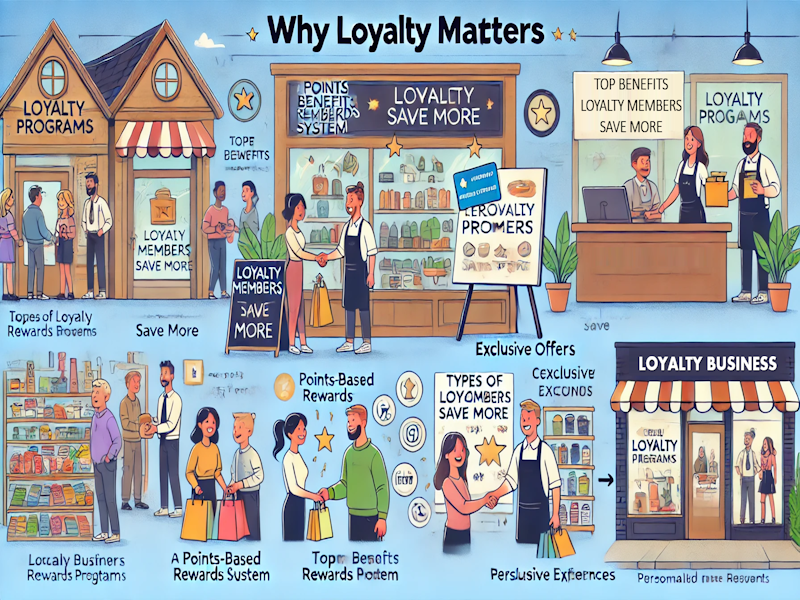IT's Simple
- Returning Customers Spend More: Loyalty isn’t just about keeping customers—it’s about maximizing their value. Studies show that loyal customers spend up to 67% more than new customers, as they are more familiar with the brand, trust its products, and tend to make larger, repeat purchases. This statistic underlines the potential value in investing in existing relationships rather than focusing solely on new customer acquisition.
- Cost Efficiency of Retention: Acquiring a new customer is estimated to be 5-25 times more expensive than retaining an existing one. This cost difference highlights the efficiency of focusing on loyalty and retention, especially for local businesses with limited budgets. By building loyalty, businesses are not only investing in their long-term profitability but are also protecting their bottom line from the high costs of customer acquisition.
- Increased Marketing ROI: Loyalty programs can increase the ROI of a local business's marketing efforts significantly. According to research, a small increase in customer retention—just 5%—can increase profitability by anywhere from 25% to 95%, depending on the industry. This high return shows that loyalty is more than just a “nice to have”—it’s a smart investment with tangible benefits.
- Community Engagement and Connection: Loyalty in a local business context is often about connection. About 86% of consumers prefer shopping with businesses that engage them directly, indicating that customer engagement builds loyalty and fosters a strong relationship. For local businesses, being active on social media, hosting events, or simply recognizing customers can lead to strong, community-based loyalty.
Top Benefits of Loyalty Programs for Local Businesses
- Increased Customer Lifetime Value (CLV): CLV measures the revenue a business can expect to earn from a customer over their entire relationship. Loyalty programs are a powerful driver of CLV, as loyal customers typically spend more per purchase and visit more frequently. On average, businesses with loyalty programs report that 45% of their sales come from loyalty members, who are more likely to make repeat purchases.
- Data Insights for Better Service: Loyalty programs are goldmines for customer data. When customers participate in these programs, businesses gain insights into their preferences, shopping patterns, and purchase frequency. This data allows local businesses to tailor their offerings, communicate more effectively, and deliver experiences that customers find memorable. Knowing that 40% of companies report gathering customer data as a key benefit of loyalty programs emphasizes its value for tailoring services and communications.
- Emotional Loyalty as a Revenue Driver: Customers who feel emotionally connected to a brand bring in higher revenue. Emotionally engaged customers have a lifetime value that is 306% higher than that of the average customer. For local businesses, creating emotional connections can turn customers into advocates who not only return but also actively promote the business to their friends, family, and social networks.
Types of Loyalty Programs That Work for Local Businesses
- Points-Based Programs: Points-based programs are straightforward and effective. Customers earn points with each purchase, which they can later redeem for discounts or rewards. This system is particularly popular, as 75% of consumers say they’re motivated to shop with businesses that offer points-based incentives. For local businesses, offering an immediate and visible reward encourages repeat visits and builds a stronger customer-business relationship.
- Exclusive Rewards & Offers: Offering exclusive deals or early access to sales for loyalty members creates a sense of exclusivity that customers value. Data shows that 70% of consumers prefer shopping at stores that provide exclusive offers. By rewarding loyalty with unique benefits, local businesses can foster a stronger connection and enhance the customer experience, giving customers reasons to stay loyal despite market competition.
- Community-Based Rewards: Local businesses can enhance their loyalty programs by offering rewards that resonate with community values. For example, they could offer discounts for supporting local causes or rewards for attending community events. Community-oriented loyalty programs not only attract new customers but also deepen existing relationships by aligning the business with the customer’s values, fostering loyalty on a personal level.
Personalized Experiences: The New Standard in Loyalty
- Personalization Boosts Spending: Personalization is no longer a bonus—it’s expected. Research shows that customers spend 34% more when their experiences are personalized. For local businesses, personalized touches like remembering a customer’s name or usual order can transform an ordinary transaction into a memorable experience, strengthening the bond between business and customer and encouraging repeat visits.
- Tailored Offers Drive Engagement: Loyalty programs that leverage customer data to offer personalized deals have a higher engagement rate. Statistics show that 68% of customers prefer brands that make them feel recognized. For local businesses, this can be achieved by tailoring offers to past purchases, special occasions like birthdays, or customer preferences. Personalized offers signal that the business understands and appreciates its customers, which is invaluable in building loyalty.
- Building Emotional Connections: Emotional loyalty is the deepest level of customer engagement. Brands with a strong emotional connection to their customers often see increased retention and advocacy. For local businesses, creating this connection can be as simple as hosting a community event, participating in local causes, or supporting local charities. Customers who feel emotionally engaged with a brand are 82% more likely to stay loyal even in the face of competing options or economic challenges.
Why Local Businesses Can’t Afford to Ignore Loyalty
- Increased Retention, Higher ROI: Loyalty programs drive significant returns for businesses of all sizes. For example, businesses with loyalty programs see an average revenue return of 4.9 times the amount spent on loyalty initiatives. This high ROI shows that loyalty programs aren’t just about keeping customers—they’re about maximizing every dollar invested in customer relationships, which is essential for local businesses looking to grow sustainably.
- Boosting Word-of-Mouth Marketing: Loyal customers are not just repeat buyers; they’re also brand advocates. About 60% of customers recommend brands they love, making loyalty programs a great way to encourage organic growth. For local businesses, word-of-mouth marketing is especially valuable, as it attracts new customers who are more likely to trust recommendations from friends and family than from traditional advertising. By incentivizing referrals through loyalty rewards, businesses can expand their reach and deepen customer loyalty.
- Mitigating Market Shifts and Building Resilience: Loyalty programs help local businesses navigate economic shifts by building a stable customer base that remains supportive, even in uncertain times. When customers feel loyal to a business, they’re more likely to continue supporting it through economic downturns or increased competition. This stability is critical for local businesses that rely on their immediate community for success, making loyalty programs an essential strategy for long-term resilience.
Implementing a Loyalty Program: Tips for Success
- Start Simple and Focus on Immediate Perks: Launching a loyalty program doesn’t have to be complicated. Starting with simple perks, like a welcome discount for new members, can immediately increase engagement. Statistics show that customers who receive a reward early in their loyalty journey are more likely to return, helping local businesses build a loyal customer base from day one.
- Gather Customer Feedback for Continuous Improvement: Feedback is essential for any successful loyalty program. Businesses that actively seek customer feedback are more likely to meet their customers’ needs and retain them long-term. For local businesses, regular feedback helps refine the program, ensuring it stays relevant to customer preferences and increases satisfaction over time.
- Promote the Program Consistently: A loyalty program is only effective if customers know about it. Consistent promotion through social media, in-store signage, and direct communication (like emails) ensures customers are aware of the benefits they can enjoy. When customers understand the value of the program, they’re more likely to join and engage, which translates into increased loyalty and long-term profitability for the business.
Loyalty as a Community-Building Tool
- Encouraging Local Partnerships: Loyalty programs can foster stronger connections between local businesses by promoting partnerships. For instance, a bakery might partner with a coffee shop to offer mutual rewards, like earning points at both locations. This approach strengthens the local business ecosystem, attracts new customers, and encourages customers to explore different businesses within the community.
- Supporting Causes that Matter: Consumers today are more socially conscious than ever, and many prefer to shop with businesses that align with their values. Statistics show that 37% of consumers are loyal to brands that support causes they care about. For local businesses, integrating charitable components into loyalty programs—like donating a portion of sales to local charities—enhances community bonds and aligns the business with the values of its customer base.
- Customer Appreciation Events: Hosting exclusive events for loyalty members adds a personal touch that customers appreciate. These events can be simple gatherings, holiday sales, or themed nights that celebrate customers and thank them for their loyalty. Such events are memorable experiences that deepen customer relationships and increase the likelihood of long-term loyalty. Additionally, they provide an opportunity for customers to invite friends and family, creating a ripple effect that can attract new business.
In conclusion, loyalty programs are more than just a tactic for increased sales—they are a strategy for building enduring relationships, strengthening community ties, and fostering local economic growth. For local businesses, investing in loyalty isn’t just about profitability—it’s about creating a community of engaged, loyal customers who support the business and, in turn, drive its success. Through loyalty programs that emphasize customer value, personalization, and community engagement, local businesses can create a loyal customer base ready to support them for years to come.


